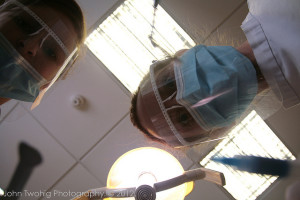You know the benefits of preventative care when it comes to your health. Depending on your age, you should see your physician at regular intervals that might range from twice yearly to every few years in order to be screened for various health problems. While you may know that seeing your dentist every six months can help you avoid the pitfalls of gum disease and tooth decay, did you know that your dentist might be the first to see the signs of serious diseases? Here are some of the health problems that your dental health professional might be able to detect.
Sleep Apnea
Obstructive sleep apnea is a condition that can cause you to stop breathing in your sleep. Many times, the symptoms of this disease are non-specific and include things like fatigue and headaches. Over the course of time, sleep deprivation and periods of stress caused by low oxygen levels can negatively impact your health. One symptom of sleep apnea is tooth-grinding, also called bruxism. This can be the body’s way of getting you to move your jaw in such a way as to allow you to breathe more easily during sleep. If you are grinding your teeth and also suffering from other symptoms of sleep apnea, your dentist may recommend making an appointment with your primary care physician or a sleep specialist to evaluate you for this condition.
Diabetes
Diabetes is a condition characterized by problems with insulin levels and blood sugar. Left untreated, it can lead to blindness, severe infections, kidney disease, and even death. Common symptoms include excessive thirst and urination, extreme hunger, and weakness. Another common symptom is frequent infections that don’t respond well to treatment. If you have dental abscesses or infections that don’t clear up with antibiotics and the necessary dental work, your dentist might suspect that you have diabetes. You would need to see your PCP or an endocrinologist for diagnosis and treatment.
Osteoporosis
Women who are approaching or past the age of menopause can suffer from bone loss and weakness caused by osteoporosis. Sometimes the first symptoms can include loose teeth and receding bone in the jaw, which are likely to be detected by your dentist. Another common occurrence is that dentures may cease to fit correctly after being worn for months or years without incident. If your dentist suspects osteoporosis, he or she will recommend that you see your PCP as soon as possible for diagnosis and treatment options.
Of course, seeing your dentist regularly can also allow him or her to screen you for oral cancers, as well as masses in your neck and face that might otherwise go undetected. He or she might even see symptoms of heart disease and other potentially life-threatening diseases. Your dentist should be considered a valuable member of your health care team.
If you are experiencing one or more of these symptoms, call your doctor. Call our offices if you have any questions or would like to schedule an appointment.













